1
Pack smart
No, we don’t mean take a suit. Think about what you’re packing and where you’re placing it in your bag. Multi-tools and other sharp objects have to go in your hold luggage or you risk being whisked aside by airport security and having them taken off you – or worse.
It’s worth chucking a spare set of underwear in your hand luggage too, in case your main bag doesn’t make it to the other end.
2
Do it yourself
If you’re on a tight budget, look to hire a self-catering style chalet with a group of mates and cook for yourself. You can pick up decent ingredients for not very much cash in local markets and supermarkets, although you’ll pay more of a premium in popular resorts.
When driving over, take supplies with you. And don’t forget the teabags – a proper British brew abroad isn’t always easy to come by.
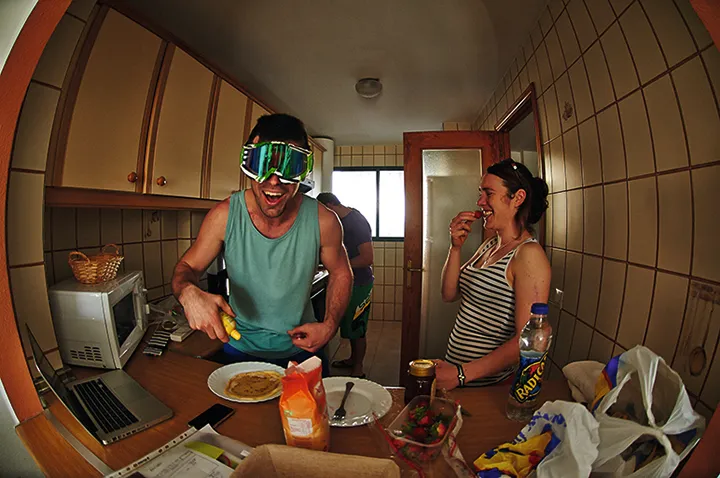
3
Protect your pride and joy
A bike bag is a great investment for safeguarding your ride from careless baggage handlers, but a cardboard box can still do the job well if you pack it right.
- Frame – Cover as much of the frame as you can in bubble wrap or pipe lagging, paying particular attention to the sides and the chainring.
- Pedals – Remove the pedals and wrap them in bubble wrap or cardboard, then tape them under the saddle to stop them moving around.
- Wheels – If possible, leave the back wheel in the frame to protect the rear mech. It’s a good idea to take the brake rotors off to stop them getting bent. Slip some cardboard between the front wheel and frame to prevent scratches.
- Fork – Use plenty of pipe lagging or bubble wrap to protect the fork’s stanchions and lower legs.
- Handlebar and stem – Remove the bar and stem, cover them in bubble wrap and ziptie them to the frame.
- Brakes – Put pad spacers in both callipers so the pistons don’t pop out.
- Rear mech and hanger – Unbolt these from the frame and wrap in plenty of bubble wrap.
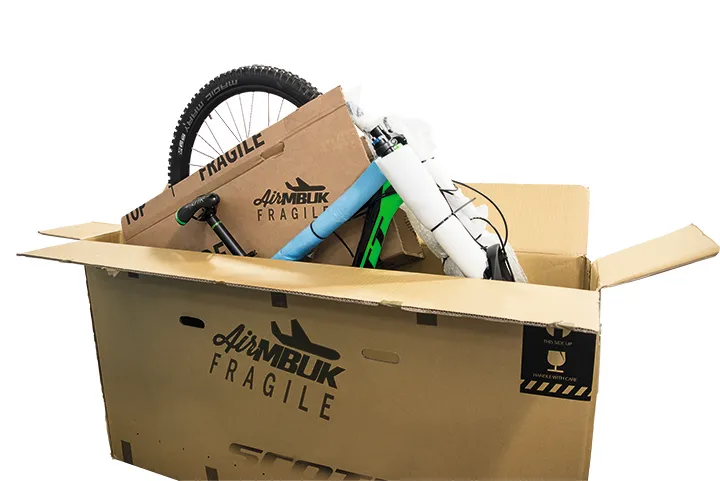
4
Hire a guide to find the hidden gems
Sure, part of the fun of riding abroad can be hunting down trails for yourself, but for decent off-the-beaten-track adventures, consider hiring a guide to show you the best places to ride. You’ll save a load of time on the hunt and leave yourself more time for enjoying the good stuff.
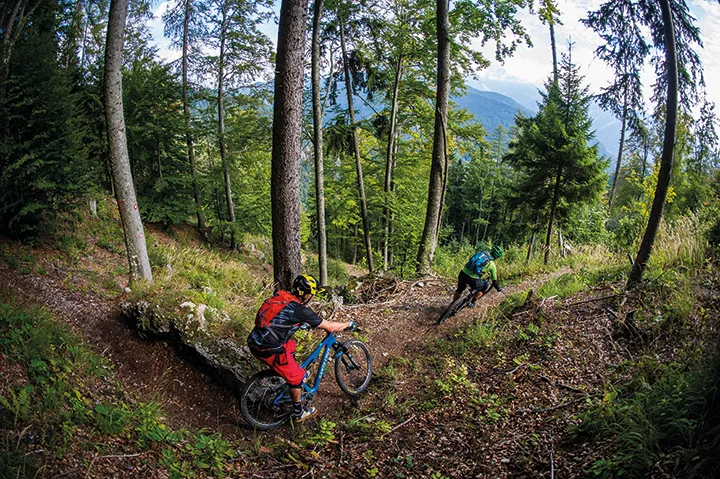
5
Take tolls into account
When driving through France, Austria and Switzerland you need to consider motorway tolls as well as the cost of your fuel.
In France, motorways are ticketed, so you pay for the distance you drive. You should except to pay around €100 at toll booths to get to the Alps, for instance.
In Switzerland, you have to buy a sticker that you attach to your windscreen. You can then use their motorways for the rest of the year. The price decreases as the months progress and is about €40 by the summer.
Austria uses a similar scheme, but you can get a day pass (around €15) or a week pass as well as an annual one.
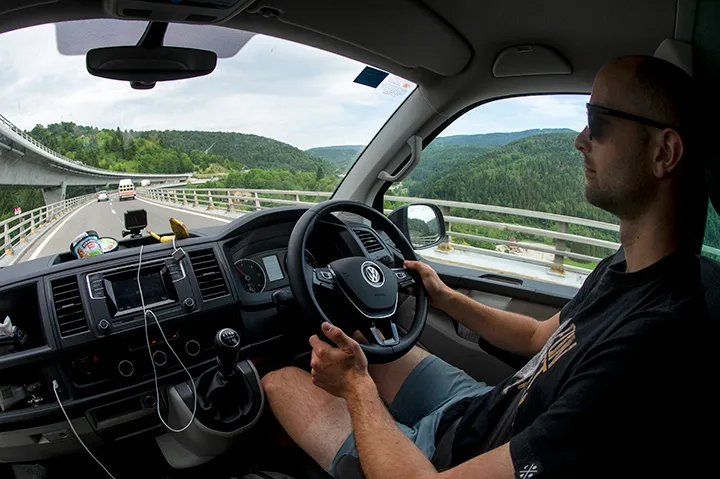
6
Carry your helmet as hand luggage
Helmets are usually classed as carry-on items. That means you can take your lid onto your flight along with your hand luggage, though if it’s in a helmet bag you may be told to take it out. Check with your airline just in case – you don’t want to have it taken off you at the departure gate!
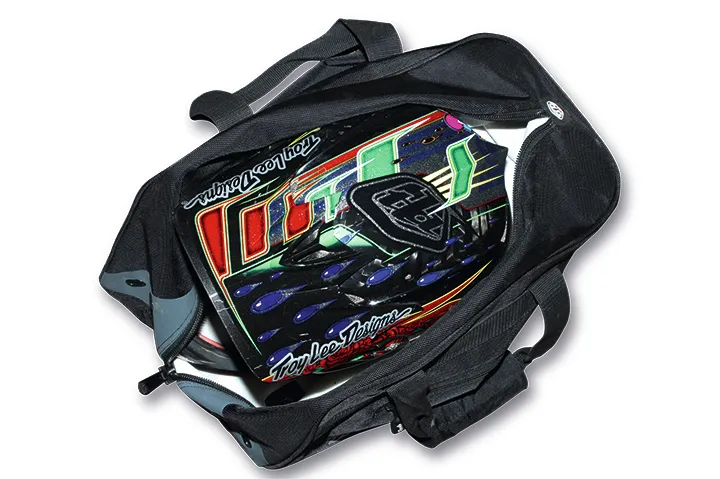
7
Maximise your weight allowance
If your airline has a generous enough weight allowance, you can pack out your bike box with holiday essentials like shoe and clothes. Knee pads can provide extra protection for your bike.
8
Prepare for the worst
Things can get very expensive, very quickly if you injure yourself overseas. Apply for a free European Health Insurance Card (EHIC) via the NHS – it’ll allow you state healthcare in the European Economic Area at a reduced cost or for free (until the UK leaves the EU).
Travel insurance is essential too – and you often need it when booking accommodation. Be sure to check that MTBing is covered.
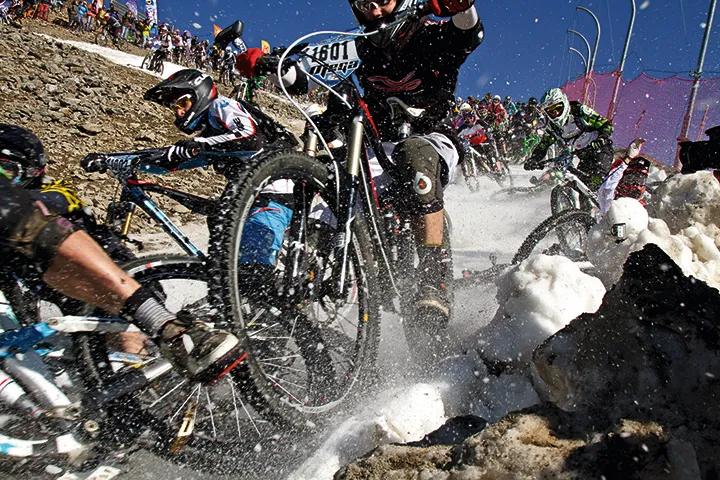
9
Take some time off the bike
It’s tempting when on a biking holiday to go full-on and ride flat out the whole time you’re away. But it’s worth taking a bit of time off and letting your body recover properly between rides. That way you’re less likely to come a cropper and pick up an injury, and you’re more likely to enjoy the time you do spend on your bike.
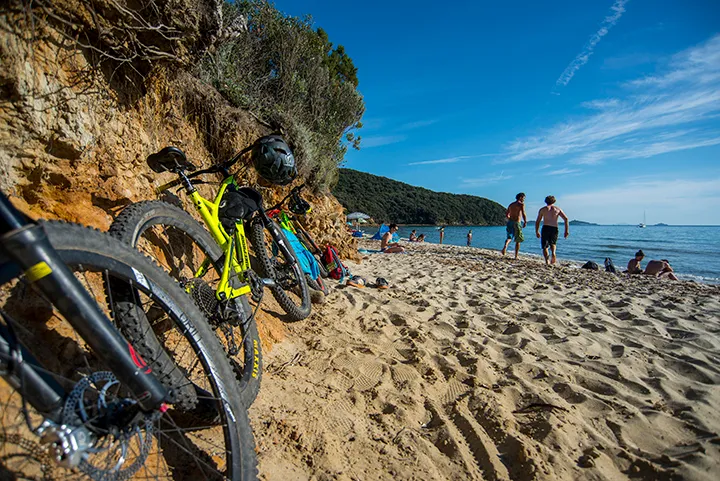
10
Don’t forget a good selection of spares
Locating a good bike shop while abroad can be tricky and you risk paying over the odds for replacements in popular cycling resorts, so consider taking your own spares – easy things that don’t take up much room.
- Inner tubes – Punctures are inevitable so carry as many spares as you can. If you’re running a tubeless set-up, take extra sealant too.
- Brake pads – Potentially steeper, unfamiliar terrain and long days in the saddle mean you’ll be on the brakes more.
- Chain links/pins – A broken chain could ruin a ride, especially if it happens miles from where you’re staying.
- Chain lube – With all that riding on different terrain, it’s worth coating your chain with fresh lube every day.
- Shock bushings – More bumps mean more shock movement, and more shock movement means more wear on your bushings.
- Gear cables – The bumpy terrain and increased movement of your rear mech will cause your cables to wear out faster than usual too.
-------------------------------------------------------------------------------------------------------
This article originally appeared in issue 353. You can find that and other back issues of MBUK here.